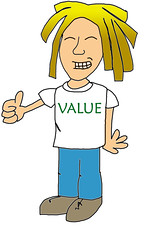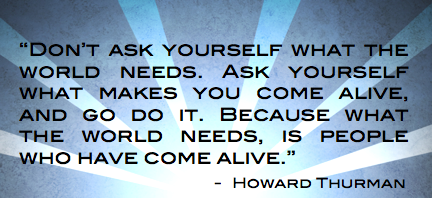Sean shares the inspiration and deeper meaning behind the One Week Job movement. He suggests that we’re experiencing “a revolution in work consciousness. A shift in how we as a culture view work and our relationship with it.” He believes that expressing our passions and unique gifts lead us to greater fulfillment both individually and collectively. “WHAT MAKES YOU COME ALIVE?” (7min)
Why Do You Do What You Do?
 Ian and I are incredibly grateful to be in a situation where we can positively impact the lives of others. It's profoundly rewarding to know that your work makes a difference.
Ian and I are incredibly grateful to be in a situation where we can positively impact the lives of others. It's profoundly rewarding to know that your work makes a difference.
When asked, "Sean, what do you want to do?"
Most often I respond with our future plans for One Week Job (which we're both very excited about!), other times I'll talk about my desire to be a Teacher (Gym class, French), but if I'm really engaged and thinking on a bigger picture scale, it all comes down to this.
"I want to create things that inspire people to live the best life they possibly can."
Yes, I realize this is vague. No, I'm not saying that there is a model "best life" to which we should all aspire to.
I want to inspire people to dig deep and ask themselves the tough questions that will allow them to define what their "best life" looks like, what it feels like, and to uncover what genuinely makes them come alive.
I'm fulfilled when I'm connected to the meaning of my work. Not just on a conceptual level, but to actually feel at my core that what I'm doing matters. In anything we do, work or otherwise, it's easy to get caught up in the details and forget the deeper meaning of why we're doing what we're doing. When in reality, it's the most important question to ask ourselves. When we are truly in line with the response, it's no longer work in the traditional sense, but rather a gift that we wish to share with the world.
I wanted to share an email that we received today that reminds Ian and I why we do what we do:
I have been sitting home on unemployment for over 6mos.. I am veteran, 42 years old with a 7 year old girl. I am an electronic tech, and i have been so scared to go out there and get a new job, afraid that i will have to start from the bottom again and work my way up. I just watched your movie, and i have a new found courage about getting a job.. i am gonna make my best effort now and make the most out of what ever job i get.. thanks. man... wish me luck Sean.
We all have fear, yet we all have profound strength, courage, and the ability to affect lasting change, both within ourselves and in the world - sometimes we just need a gentle reminder.
And so, I'll ask one more time -
Why do you do what you do?
[VIDEO] - David Aplin Recruiting at The University of Calgary
Check out a sneak peek at the Discover Your Passion event in Calgary last week. I pulled together some quick clips, and interviews with David Aplin Recruiting reps Kathryn Farrell and Jeff Aplin. They share their thoughts on why they joined up with One Week Job and how much they enjoy helping you find your passion!
Check out David Aplin Recruiting's new resource site for grads 'From Here To Career."
What It's Like....To Be a Freelance Photo Journalist for National Geographic
Amy Toensing has been a professional photographer since 1994. She has provided content for The New York Times, The Boston Globe, and National Geographic. She has traveled around the world, shooting stories across Australia, India, Africa, Puerto Rico, the island of Tonga, and at home in the United States. Amy looks into the lives of ordinary people, and with her camera, finds something special. She is currently working on her 13th story for National Geographic in Australia. In spite of her demanding schedule, Amy (very graciously) sat down with me for a couple hours, and shared her journey. This celebrated photographer speaks about the realities of an often glorified industry, and how photography is the art that makes her feel 'connected to the world.'
Amy Toensing
I Am: a Freelance Photo Journalist, as well as a National Geographic Contributing Photographer.
I have been working towards this since: 1994.
Originally, I received a degree in Human Ecology, where my main focus was Anthropology and Sociology. Towards the end of my degree, I took a photography class and attended a storytelling program called Salt, in Maine. I shot a story on ‘migrant broccoli pickers’ that actually won an award for College Photographer of the Year for documentary work. I was 24 years old.
After graduation, I worked as a waitress and shot part-time for the local newspaper. Then, because of the broccoli pickers story I did, I was picked for the Eddie Adams Workshop. This is a prestigious 4-day intense photography experience, where top photographers from around the U.S, mentor 100 up-and-coming photographers. We teamed up with professionals from the New York Times, the Boston Globe, and National Geographic. My team leader was Nancy Lee, the Director of Photography for the New York Times. For those four days, we lived and breathed photography.
During one of our frantic shooting assignments, our car battery died on the way to the shoot! Luckily, we were parked on a hill and I knew how to push-start. It didn’t take long, and we were on our way again; after that, my NYT editor definitely remembered me!
After the workshop, Nancy Lee gave me a few assignments and also asked me to do some work in their Washington DC bureau while I was there visiting my family. Once there, they asked me to stay for a month and help out managing the office. It was tough, as I had been offered a full time shooting job at my local paper, but in the end I decided to move to Washington. I covered the White House and Capitol Hill for 4 years before heading back to school, this time on scholarship to receive my master’s degree at Ohio University. It was here that I had a photography internship at National Geographic.
While interning at Nat Geo, I was encouraged by Susan Smith, the Deputy Director of Photography to submit a story idea for a shoot. I was one of the lucky interns who actually got the green light, and not only did they let me shoot it, they published it!
I have been full-on freelance since 1999, and am now on my 13th story for National Geographic. I have also shot for publications such as Time Magazine, Newsweek, the Boston Globe and the New York Times, and do some commercial work.
My responsibilities include:
As a freelancer, I run a business. This includes accounting, organizing, and marketing myself in order to get more jobs. Once I have a job, I research the story, map it, and organize the logistics of the shoot; transportation, accommodation, budget and most importantly - I decide where and how to tell my story. After the shoot, comes all the post-production: ingesting, editing, model releases, and archiving. I keep 3 copies of each file as backup.
What I love about it:
Photography is the thing that drives me; it’s the art that makes me feel connected to the world. The act of taking pictures makes me feel centered and good. Also, something that I love about National Geographic is that hire photographers based on their own personal style; they hire you to be you.
What I hate about it:
I hate the stress that comes with the job. It’s a battle to keep both the business side and the art side of photography balanced. As a freelancer, you’re always thinking about where and when your next job is going to come. Plus, if you’re not in the shooting ‘zone,’ it’s hard to force creativity. But it’s essential that I find ways to establish a creative environment for myself on every assignment.
Common misconceptions about my work:
I have one of the most misunderstood jobs in the world! People think that photography is amazing, glorious, and romantic, and that all I do is travel around the world and take pretty pictures - but there’s nothing easy about it! Photography is not a job - it’s a lifestyle and a huge commitment. It’s hard work, extremely competitive and not very well paid. But it’s amazing, fulfilling, and incredibly rewarding.
Is there a special moment that stands out in your career?
There is honestly a special moment on every assignment, and that’s why I’m a photographer. I get to be in people’s home and share some of their most special moments. I get to witness humanity from the front row. It’s such a wonderfully rewarding career.
Advice to those interested in a career like mine:
It’s a tough time for the freelance photography industry, but I would never steer someone away because of that. If you have a connection with photography, follow your heart. However, I would tell people to be realistic; it’s going to be hard work, and you have to realize that photography is more of a lifestyle than a job.
Lessons to Learn
These days with digital photography, anyone can pick up a camera and shoot, but in order to be a successful photojournalist you still have to be skilled at telling a story with your images. That’s entirely different than simply taking good pictures. You also have to be good at thinking on your feet, working with people, traveling in difficult places and most important, you need to have a unique way of seeing the world which shows in your images.
To see more of Amy Toensing's images, visit www.amytoensing.com
8 Reasons to Become a Mentor
The origins of mentoring can be traced back to ancient Greek mythology. When Odysseus went to fight in the Trojan War, he put his trusted friend, Mentor, in charge of his son, Telemachus. Ever since, the term ‘mentor’ has generally come to define someone with more experience, imparting their wisdom and values on someone with less experience. This relationship can be personal, spiritual, and educational.
Perhaps you’re a baby boomer who has considered taking on a mentee, but can’t decide if it’s worth your time and energy. Look no further! Here are 8 (great) Reasons to Become a Mentor.
1. Being a mentor bridges the generation gap.
Generally speaking, most mentor/mentoree relationships happen between someone in an older generation, coaching someone in a younger generation. If you’re mentoring someone younger than you, realize that it can be a productive experience for both sides, as each generation can come to understand the other’s motivations, career goals, and attitudes. Soon, it won’t feel like there’s any gap at all.
2. Being a mentor can help you redefine your own career path and goals.
By looking at your job through a mentee’s eyes, you gain outside perspective that could help you answer some tough questions about your career.
3. It's a wise business strategy to mentor others.
By becoming a mentor, you can keep on top of new trends, issues, and emerging technologies through your mentee. The partnership can also keep your mind sharp, since a good mentee will challenge you with great questions and creativity.
4. You build long lasting relationships in your industry.
If you and your mentee continue working in the same industry, you gain a valuable ally and sounding board for years to come. Eventually you may even find yourself at different companies, but your professional relationship can last to benefit you both.
5. By acting as a mentor, you set the tone of your industry to those just entering it.
What better way is there to ensure continued success or instigate change in the workforce? Help others grow into the types of employees you would like to see.
6. Pay it forward.
Remember how confused and stressed out YOU were when you started working? By acting as a mentor, you can help make the transition easier on someone else. Having a mentor is also associated with improved job satisfaction, positive career plans, quicker promotions, and a greater probability that the mentee will eventually become a mentor themselves. Don’t be afraid to share your failures as well as your success; some of the best lessons come from the worst mistakes.
7. Think about the impact you can make on someone else’s life!
Chances are, as their first point of contact within an industry, your mentee will look up to you and your experience. Whether you realize it or not, mentors have a huge influence on a mentee’s career (and life) outlook. Mentors have the opportunity to build up someone’s skill set and confidence – and that’s a relationship not easily forgotten. Not to mention, the idea of enlightening another person's life will always add additional happiness to yours.
8. You have the chance to share your passion with others.
By coaching someone just entering the work force, you’re in the position to get them just as excited about the job as you are! Share your tips for making entertaining power point presentations, effective web sites, or even the best spot for lunchtime appetizers. You love your job – why not encourage someone else to feel the same?
In Conclusion
Ultimately, the success of your mentee is up to them; as a mentor you can only provide so much guidance, but the effect you can have on that person’s life is priceless. We have something to learn from everyone, and we also have something to teach everyone.
Treat your position with respect, and there’s no doubting that both the mentor and the mentee will benefit from the relationship for years to come.
Share your stories of being a mentor in the comments!
The Inspiring Story Of Ernie Kasper
At the recent screening of the One Week Job film in Surrey, Canada, Sean and Ian had the pleasure of meeting Ernie Kasper. Ernie Kasper was, by all accounts, a healthy, happy, and energetic young man. He had a loving wife, an animated daughter, and a precious, newborn son. However, shortly after the birth of his second child, Ernie suffered what doctors thought impossible; he had a stroke.
Ernie lost the ability to speak and his walking became awkward and disjointed. Doctors refused to believe that someone so young and fit could endure such a diagnosis, but there was no denying the trauma that Ernie's body was going through.
Even though his days were filled with hurt and confusion as to why this had happened to him, Ernie realized that the best way to deal with his condition was to not let it stop him from living.
Day by day, through intense physical and mental anguish, he taught himself to walk. And not only has Ernie learned to limp, skip, and walk again since his stroke - but he has actually ran. 37 km in fact, and he's not stopping there.
Ernie's attitude is incredible. Everyday he consciously chooses to set an example for other stroke victims, by refusing to believe that something wrong with his body can stop his spirit. As he puts it, 'When life hands you lemons - make apple juice. That will always make people wonder!'
Check out Ernie's thoughts after seeing One Week Job.
Watch Ernie's Journey
The 50 Best Work And Passion Quotes Of All Time
 Have you ever found yourself wrapped up in the fetal position, sucking your thumb, while a loved one desperately tries to pull on your suit jacket so you don’t miss your carpool?
Have you ever found yourself wrapped up in the fetal position, sucking your thumb, while a loved one desperately tries to pull on your suit jacket so you don’t miss your carpool?
Have you become so bored with work that you’ve started keeping sandwich crusts under your keyboard, just to see how many ants you can attract? Have you started thinking about work as simply…work?
Everyone needs a little career inspiration from time to time.
Whether it’s to reframe your workplace goals, or to give serious thought as to why you’re working a specific job in the first place. It’s nice to know that others have been there before, questioning, suffering, and wondering just as much as the rest of us sandwich-hoarding, ant-counting, schmucks.
So take a moment to read the "words about work" of those who have gone before, with grace and hilarity. Perhaps then we can take a step back, pull our thumbs out of our mouths, put on our suit jackets, and get into that carpool with pride.
- Amanda Lowe, One Week Job Blogger
1. To be successful, the first thing to do is fall in love with your work. - Sister Mary Lauretta
2. Trust not what inspires other members of society to choose a career. Trust what inspires you. - The Lazy Person's Guide to Success
3. You are what you do. If you do boring, stupid, monotonous work, chances are you'll end up boring, stupid, and monotonous. - Bob Black
4. I believe you are your work. Don't trade the stuff of your life, time, for nothing more than dollars. That's a rotten bargain. - Rita Mae Brown
5. Make no little plans; they have no magic to stir men's blood . . . Make big plans; aim high in hope and work. - Daniel Burnham, American architect (1846 - 1912)
6. You can't depend on your eyes when your imagination is out of focus. - Mark Twain
7. A career is wonderful, but you can't curl up with it on a cold night. - Marilyn Monroe
8. I'd rather be a failure at something I love than a success at something I hate. - George Burns
9. I'm sick of people sittin' in chairs stating their problems. Then we roll the videotape... then we have our experts on the topic... I'm in the 'What's next?' phase of my career. - Oprah Winfrey
10. Never say anything about yourself you do not want to come true. - Brian Tracy, American Author
11. If we resist our passions, it is more through their weakness than from our strength. – Francois de la Rochefoucauld, French Author
12. The biggest mistake that you can make is to believe that you are working for somebody else...The driving force of a career must come from the individual. Remember: Jobs are owned by the company, you own your career! – Earl Nightingale, Motivational Speaker
13. The people who get on in this world are the people who get up and look for the circumstances they want, and, if they can't find them, make them. - George Bernard Shaw
14. If people knew how hard I worked to get my mastery, it wouldn't seem so wonderful after all. - Michelangelo
15. Your work is to discover your work and then with all your heart to give yourself to it. - Buddha
16. If you have to support yourself, you had bloody well better find some way that is going to be interesting. - Katherine Hepburn
17. My mother said to me, "If you become a soldier, you'll be a general, if you become a monk you'll end up as the pope." Instead, I became a painter and wound up as Picasso. - Pablo Picasso
18. Passion will move men beyond themselves, beyond their shortcomings, beyond their failures. - Joseph Campbell, American Mythologist, Writer, and Lecturer
19. Any human being is really good at certain things. The problem is that the things you're good at come naturally. And since most people are pretty modest instead of an arrogant S.O.B. like me, what comes naturally, you don't see as a special skill. It's just you. It's what you've always done. - Stephen Jay Gould, Evolutionary Scientist
20. If you don't stand for something, you'll fall for anything. - Michael Evans
21. There's nothing in the middle of the road but yellow stripes and dead armadillos. - Jim Hightower, Radio Commentator and Author
22. He who would learn to fly one day must first learn to stand and walk and run and climb and dance; one cannot fly into flying. - Nietzsche
23. Many of us have created lives that give very little support for experimentation. We believe that answers already exist out there, independent of us. What if we invested more time and attention to our own experimentation? We could focus our efforts on discovering solutions that work uniquely for us. - Margaret Wheatley, Author and Management Consultant who studies organizational behavior
24. Most folks are about as happy as they make up their minds to be. - Abraham Lincoln
25. We either make ourselves miserable, or we make ourselves strong. The amount of work is the same. - Carlos Castaneda, Peruvian born American Anthropologist and Author
26. Desire! That’s the one secret of every man’s career. Not education. Not being born with hidden talents. Desire. - Bobby Unser, Retired Car Racer
27. People with clear, written goals, accomplish far more in a shorter period of time than people without them could ever imagine. - Brian Tracy, Author
28. A lot of fellows nowadays have a B.A., M.D., or Ph.D. Unfortunately, they don’t have a J.O.B. - Fats Domino
29. What if "the hokey pokey" is REALLY what it's all about? - Curtis Spencer
30. There is no end. There is no beginning. There is only the infinite passion of life. - Federico Fellini, Italian Film Director (1920-1993)
31. Would I ever leave this company? Look, I'm all about loyalty. In fact, I feel like part of what I'm being paid for here is my loyalty. But if there were somewhere else that valued loyalty more highly, I'm going wherever they value loyalty the most. – Dwight Schrute, from the television show ‘The Office’
32. I am not young enough to know everything. - Oscar Wilde
33. In fifty years, he never worked a day. To him, nine to five was odds on a horse. - Archie Bunker, from the television show 'All in the Family'
34. When you're following your energy and doing what you want all the time, the distinction between work and play dissolves. - Shakti Gawain, Pioneering Author & Teacher in the field of Personal Growth
35. I like work; it fascinates me. I can sit and look at it for hours. – Jerome K. Jerome, English writer and humorist
36. Human progress is neither automatic nor inevitable...Every step toward the goal of justice requires sacrifice, suffering, and struggle; the tireless exertions and passionate concern of dedicated individuals. – Martin Luther King, Jr.
37. Be still when you have nothing to say; when genuine passion moves you, say what you've got to say, and say it hot. - D.H. Lawrence, English Novelist (1885-1930)
38. Passion is the quickest to develop, and the quickest to fade. Intimacy develops more slowly, and commitment more gradually still. - Robert Sternberg, American Psychologist and Psychometrician
39. Passion kept one fully in the present, so that time became a series of mutually exclusive 'nows.' - Sue Halpern, Author
40. They may forget what you said, but they will never forget how you made them feel. – Carl W. Buechner, Author
41. We cannot be sure of having something to live for unless we are willing to die for it. – Che Guavara
42. Rest in reason; move in passion – Khalil Gibran, Lebanese American artist, poet and writer
43. Throughout my career, if I have done anything, I have paid attention to every note and every word I sing...If I cannot project this to a listener, I fail. - Frank Sinatra
44. If passion drives you, let reason hold the reins. – Benjamin Franklin
45. I am tomorrow, or some future day, what I establish today. I am today what I established yesterday or some previous day. - James Joyce, Irish Novelist
46. If you follow your bliss, you put yourself on a kind of track that has been there all the while, waiting for you, and the life that you ought to be living is the one you are living. Wherever you are—if you are following your bliss, you are enjoying that refreshment, that life within you, all the time. - Joseph Campbell, American Mythologist, Writer, and Lecturer
47. I think everyone should experience defeat at least once during their career. You learn a lot from it. - Lou Holtz, American football coach and author
48. If you wish to achieve worthwhile things in your personal and career life, you must become a worthwhile person in your own self-development. - Brian Tracy
49. One can never consent to creep when one feels the impulse to soar. - Helen Keller
50. The belief that you can have a meaningful career is the first step to finding one. - Sean Aiken, Author and Creator of the One Week Job Project
Did we miss any great quotes on passion and work? Share in the comments!
Yoga on My Mind
Deep Breath. I've been practicing hot yoga off and on (more off, than on, really) for the last 3 years. I can still remember the first time I came out of a class...I felt completely peaceful and at ease. I was relaxed and energized at the same time. My mind was clear, and my body was elated!
Due to daily commitments and pressures, yoga has come and gone in my life. But thankfully, the results are always the same - inner peace and outer strength.
As of today, I have completed 3 days straight of my yoga practice. To some, this probably doesn't sound like much, but that's the most consistency I've ever experience! I feel so safe in the studio...it probably sounds cheesy, but I know that I'm there for myself and the only person I have to please is me.
Yesterday I met with Lisa Whitford, co-owner, studio director, and teacher of Moksha Yoga Calgary. When I originally talked to her about spending time with the studio as part of my OWJ program, she was immediately interested. Lisa has been teaching for about 8 years, and originally got into yoga because of some discomfort she was experiencing with her back. Talking with Lisa is calming in and of itself. She has a lot of insight into the whole crazy-yoga-trend, and hasn't let herself forget why she came to practice in the first place.
Personally - I'm kind of enjoying using the term 'practice.' To me it means that yoga is always a work-in-progress - you're not some 'professional' yogi who never makes a mistake, you're growing and trying new things in order to get better at it. I've never used the term before, but I love the way it applies.
One of the first points Lisa made about yoga, is that it's not just about the physical state of the postures. She explained that there's a certain grace needed to physically transition through the postures, and that one of our goals should be to transfer that grace off of our yoga mat, and into our daily lives.
This makes so much sense. It takes concentration and guts to get into (and then hold?!) some of the positions yoga teaches. If you can perform these postures without giving up, without complaining, and with a sense of determination - all the while being realistic and honest with yourself and your limitations - you have practiced with grace.
"It's not true until it's true for you." - Lisa Whitford, Moksha Yoga Calgary
When Lisa made this point, she was talking about yoga and the different variations and definitions it has grown into: Moksha, Bikram, Ashtanga, Hatha, Anusara, etc., are all different forms of yoga practice. But no matter what you call it, or what postures you assume, the purpose of these variations remains the same: to unite the body and the mind.
The term 'yoga' roughly translates as 'yoke' or 'union.' The Yoga Journal notes that the purpose of yoga is to,
"...strengthen the body, to bring flexibility not only to the spine, but to the mind, and to calm the nervous system and quiet the mind enough to connect the practitioner more deeply to his or her spiritual center."
Lisa's original statement, however, really applies to the One Week Job Program: "It's not true until it's true for you." Have you been forcing yourself into a career that you're not totally sure of? Do you feel pressure to please others in regards to your job description, as opposed to yourself? Have you been selling yourself short? What it really comes down to, is that if you don't believe in what you're doing, why are you doing it?!
I've personally struggled with my own lack of direction, and in the end, you need to do what makes you happy. It seems like an obvious point to make, but from my conversations with others - it's not always the case.
What's your yoga? What unites your body with your mind? Is it running? Making music? Writing? Driving a combine?! Whatever it is, embrace it!
I am absolutely embracing this week of yoga - and am really thinking that if I had the opportunity to do it full time, it would be an amazing experience. I owe it to my body, and my mind could definitely use some conditioning as well... Maybe there should be a OWJ devoted especially to learning about yourself through yoga...thoughts?!
Thanks for sharing this experience with me...
Namaste - the light in me, honours the light in you!
- Amanda
A Need for 'Higher Education': Interview with Author Kenneth Jedding
When most of us graduate from college, we have little knowledge/experience on how to navigate the real world. Kenneth Jedding was no different.
 “When Jedding first graduated from college he went into a bookstore looking for “THE” book – a book that would tell him all the things he didn’t learn in school, how to get a job, how to navigate friendship and love, how to maintain a good relationship with family and above all, how to stay cool.”
“When Jedding first graduated from college he went into a bookstore looking for “THE” book – a book that would tell him all the things he didn’t learn in school, how to get a job, how to navigate friendship and love, how to maintain a good relationship with family and above all, how to stay cool.”
Unfortunately, no such book existed at the time. Fortunately, Jedding was inspired to write such a book.
Kenneth Jedding is the author of HIGHER EDUCATION: On Life, Landing a Job and Everything Else They Didn't Teach you in College. For 10 years, he has lectured as a career counselor and life coach at colleges and universities across America. He is currently a psychoanalyst.
I recently had the chance to catch up with Kenneth and ask him some questions about his new book HIGHER EDUCATION and his opinions on life after graduation.
I hope you get a lot out of his great insights, and be sure to leave your thoughts in the comment section!
****
1. Generation Y is often characterized as being lazy, entitled, and generally a lost generation refusing to grow up. Having spoken and worked with many Gen-Y’ers, what is your opinion on their work ethic and how do you see Gen-Y contributing to the working world
Good question. Complicated question.
Gen Y has a bad reputation, as you mentioned, but I think your description masks a larger truth. You're a transitional generation. In the 80's and 90's, the world evolved into what it's going to be for the next century. The new modes of communication were your baseline. For you, that's just how life is. So your perception of time is futuristic. But I think in many ways the world is still in the old time mode, so there's what I'd call generational jet lag. This comes off as laziness. But it might just be that you can't believe that non-electronic life is so slow.
I think the Y's reaction to life, what you called not growing up, reflects a different wiring. To give an example, when I was 18 I had a French girlfriend I met while backpacking. We wrote three snail mail letters a week. It was very fun and sexy, but it existed mostly in our heads and imaginations. If we did it now we'd be on Skype: it would be a hundred times cooler though still long distance (i.e. no physical touch or sex.)
But how can you go from one time orientation to the other? Say, from having a friend, or a boyfriend or girlfriend in China and keeping up with each other moment to moment--to: the slower time scheme of starting an entry level job when it seems nothing is happening, and they ask you to fetch coffee! It's easy to get discouraged and to say: Why bother?
You asked about the work ethic. Work has a puritanical connotation. Sounds too much like work. Let's say career instead.
Having a career you enjoy will make life more interesting. There aren't many other ways to do it. I think we grow up thinking "All I need to be happy is money, stuff, and love," but career needs to be with love at the top of the list. It's one of the ways to feel truly good about yourself, excited about life, and, one of the best ways to make money.
We're told we can accomplish whatever we set our minds to, the American Dream et al, but I think 9 out of 10 people who make big money love their jobs. As I discuss in the book, most people figure out what they love by trying things out. That's a slow process for every generation but for Y's it must feel like walking underwater.
You're wired for things that are real in the moment. Work starts out being unreal in the moment.
I believe Gen Y's have a ton to contribute, and, if they can forge through the initial b.s. of the work world, and trust the process even when things seem to be moving forward in super slow-motion, they'll work as hard as anyone else, and will reap the psychological, spiritual and financial rewards.
****
2. In HIGHER EDUCATION you provide some great techniques to find your passion. Do we need to find our passion in order to be happy at work?
 Yes. But it's a trick question. If you're a violinist and you play the violin out of college, you're onto your passion--but even violinists may not feel happy at first. Or, say, if you make it to the NBA, it's definitely a passion.
Yes. But it's a trick question. If you're a violinist and you play the violin out of college, you're onto your passion--but even violinists may not feel happy at first. Or, say, if you make it to the NBA, it's definitely a passion.
More to the point, for most people passion opens up incrementally. It doesn't feel like passion at first.
The Dream: I'll love what I do.
The Process: I'll start doing things to get closer and closer to what I love (i.e. start using more and more skills) and find my way to real passion at work.
You're one week job project was so interesting, Sean. You were writing about having the courage to begin.
****
3. In your opinion, why is that Gen-Y is putting off entering the real world after graduation – generally taking longer to leave their parents home, get married, start a family, and choose a career?
College costs more, leading to more debt and to living at home. I talk a lot about dealing with parents in the book.
As for getting married & starting a family, I think it's good to get to know yourself first, so waiting is not necessarily a bad thing.
****
4. You mention several examples of people who were very successful by not focusing on the money and simply doing what they love. I always questioned, “Well, what if the money doesn’t come?” In pursuit of our ideal job, how do you suggest we cope with those difficult times when our fears and self-doubt surface and we question if we’re doing the right thing?
Money can come in unexpected ways. The best way for you to make money may not be in the traditional "money" areas, as I discuss.
And yet: some careers don't pay much. Like being a teacher, working with the mentally challenged, or being a coach (unless you make it to the top in any of these areas).
What if one of those non-money professions would truly make you happy? Then it's a good idea to go for it.
Let me put it this way: If you're born to be a teacher and you do a mental two-step (It doesn't pay much so it's off the list) you may be walking around numb and confused, telling yourself "I don't know what I want to do," but you actually know.
It's easy to fear "I won't make a lot of money doing x or y," rather than trying to make just enough money in a field you love. Money is nice, for sure, but so is empowerment, being on your path, feeling confident, radiating energy that attracts others, and liking yourself. And there are many ways to get there.
****
5. I recently read a NY Times article in which a recent college grad struggling to find work was offered a job paying $40K at an insurance company. He turned it down saying that he’s holding out for the job that feels right for him. Would you recommend waiting for that perfect job, or is it more important to get into the workforce?
I don't recommend waiting for the perfect job. That makes me laugh, Sean, thinking of what you did.
Perfect's a dangerous word. I like the Leonard Cohen poem:
Ring the bells that still can ring Forget your perfect offering There is a crack in everything That's how the light gets in
We learn things in unexpected places and those things prepare us for more unexpected moments.
****
6. What one piece of advice do you wish someone shared with you when you graduated from college?
I wish someone had told me that, over time, things would work out.
****
Kenneth Jedding's book, HIGHER EDUCATION: On Life, Landing a Job and Everything Else They Didn't Teach you in College, was published April 2010 by Rodale Books and is available for purchase through the above link to Amazon.com.
The Meaning Of Work
Earlier this month at the One-Week Job book launch, we showed an advance screening of the documentary. For me, as the director, it was a treat to watch the audience react to the first viewing of the film. I also felt it was an opportunity to share my thoughts on the meaning of the project.
Here's my final speech:
Here's the full text:
At the beginning of the film, you probably noticed a quote from the Buddha. I'll read it again
“Your work is to discover your work, and then with all your heart, to give yourself to it.”
During the entire 2 years of working on this film, I had this quote tacked to my wall. It seemed entirely fitting, because Sean's journey was a journey of the heart.
After high school, Sean found himself at a crossroads. He could have chosen a career based on the goals of security and stability, but instead, he chose to follow his heart.
Even in the face of the unknown, even when people doubted him and said he was crazy. Even when he didn't know where he would sleep, or how he would eat, or what jobs he would attempt.
Sean decided his work was to discover his work.
In the same way, this film has been the journey of my own heart. It was my heart that told me to leave my old job and join Sean on his quest.
It was my heart that kept me up at 2 o'clock in the morning, editing just one more frame, before going to bed and doing it again the next day.
And it was my heart that told me this endeavour had meaning.
It was during one of my late night editing sessions that I realized the true relationship between work and fun.
The older generation tends to characterize the younger as unproductive, entitled, and often lazy. They believe the younger generation thinks work should always be “fun.”
As Sean and I learned during the One Week Job project: there is no job that is fun all of the time. That is, if you define fun as the absence of work.
The truth, I believe, is that the younger generation is actually searching for meaning. Give them a task with meaning, and they will work their hearts out.
So our task, as parents, as educators, and employers, is to show them what it's like to live life with passion. Rather than ask our graduates to accept jobs without meaning, let us strive to create a world where all jobs are meaningful.
From the bottom of our hearts, Sean and I thank you for coming tonight.
Video: Do You Hate Your Job Enough To Do Something About It?
A great interview with Ryan Paugh and Shane Mac with some food for thought for all job seekers.
"Most people say they 'hate my job' and don't take any accountability for it... in all honesty you need to do something about it." - Ryan Paugh
Don't know what to do? Do something!
 If you don't know who Seth Godin is, get to know him. In every blog post, he provides value.
Just graduated, and can't find a job? Read this recent post by Seth, Graduate school for unemployed college students.
If you don't know who Seth Godin is, get to know him. In every blog post, he provides value.
Just graduated, and can't find a job? Read this recent post by Seth, Graduate school for unemployed college students.
Reading Seth's post reminded of a conversation I had when I was a Radio DJ in Week 22. One afternoon, a Radio DJ I was working with said to me, "The most important message I take away from what you're doing is to be pro-active about figuring out what you want to do. If you don't know what to do, well don't just sit around and wonder what to do. Do something."
When I first graduated, I wasted a lot of time and energy worrying that I didn't know what I wanted to do. Of course, it didn't help my situation. I was so concerned with making the right choice that it prevented me from making any choice at all. Thankfully, I eventually recognized this.
What is your "something" going to be?
Futurist Ray Kurzweil On Why You Should Find Your Passion Now
Ray Kurzweil is an author/inventor famous for predicting the future. He says, since knowledge is rapidly becoming obsolete, the best way to prepare yourself for the future is to learn how to learn. And the best way to learn is by pursuing what your passionate about.
Classic Cartoon: Get A Job
Believe it or not, this 1985 animation is one of my most memorable artifacts from childhood. It combines classic animation with great motown tunes. Enjoy!
Hey Josh Says: Make 2009 The Year Of "Going For It"
Came across this great short film "Factory" from Josh Shipp, dubbed the Dr. Phil for Teens. Enjoy!
6 Best Blogs For Helping You Find A Passionate Career
Photo shapeshift

When you're struggling to find your passion, sometimes it helps to have encouragement along the way.
With that in mind, Ian and I have been sifting through endless websites to bring you the top 6 blogs for helping you find your perfect career, or at least help you in the right direction.
So here they are, drum roll please... (in no particular order)
1. Employee Evolution
"Employee Evolution is dedicated to helping the millennial generation answer the hard-hitting questions that come with the biggest transition of our lives."
While visually, the website delivers a simple design, the content is worth it. Employee Evolution speaks to the Gen-Y culture with conviction and helpful hints and tips for finding your career passion.
2. Brazen Careerist
Part of the Brazen Careerist blog group, Penelope Trunk began her post-secondary life as a professional beach volleyball player and since then she's been through an acquisition, an IPO and bankruptcy and come back to become a columnist for the Boston Globe.
Her blog delivers advice "at the intersection between work and life" concisely and efficiently while coming from a refreshing female perspective.
3. Pursue The Passion
A website designed to attack the problem that nearly 50% of the population is not satisfied with their job, and addresses the issue by interviewing people who are propelled by a love for their work. The website is pleasing to the eye and easy to navigate while delivering the information promised in the title.
4. The Happiness Project
A comprehensive look at what it could take to make each of us happy, and while most of us see "the feel better formula" as a bit too inside the box, Gretchen acts as an insightful compass for the direction of your passion.
5. My Gen Y Life
"Impressions and happenings of a twenty-something career gal" Melanie Lopez writes about a lighter, humorous look at life spent within the confines of an office, while offering helpful tips about a life on salary including, "The Secret to Winning Over Your Boss" and "How to Tell Your Boss You're Pregnant."
6. Escape From Corporate America
An easy to navigate website with larger than life wisdom on how to retreat from a life in a cubicle. Slightly deterring, are the numerous esoteric mentions of the NBC hit "The Office," but if you love the show and everything it represents then this may just be your haven.
"Our work lives are too long. We can't sit in a job we don't like for fifty years, it makes no sense. If we hate our jobs, we have to leave them, that's our responsibility to ourselves." -Paul Lieberstein (Toby Flenderson, The Office)
Do you have any favourite "find your passion" blogs we missed? Share in the comments!







